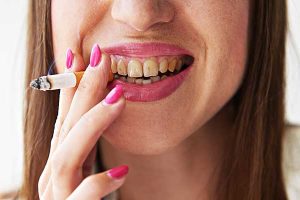Effects smoking can have on your oral health include
- Use of any tobacco product to increase your risk of developing oral cancer and gum disease (periodontal disease).
- Tobacco products damage your gum tissue by affecting the attachment of bone and soft tissue to your teeth. An example of the effect is receding gums. A receding gum line exposes the tooth roots and increases your risk of developing a sensitivity to hot and cold, or tooth decay in these unprotected areas.
- Smoking can delay healing after tooth extraction or other oral surgery.
- Smoking also can contribute to bad breath, stains on your teeth and tongue, and a build-up of tartar on your teeth.

Google image
Are smokeless tobacco products safe?
Like cigars and cigarettes, smokeless tobacco products contain a variety of toxins associated with cancer. At least 28 cancer-causing chemicals have been identified in smokeless tobacco products.
Smokeless tobacco can irritate your gum tissue, causing it to pull away from your teeth. Once this gum tissue recedes, the roots of your teeth are exposed, increasing your risk for tooth decay. The roots of your teeth may also become sensitive to hot or cold or other irritants, which means you might experience some discomfort when eating or drinking.
Sugars, often added to enhance the flavor of smokeless tobacco, can increase your risk for tooth decay. Smokeless tobacco also contains sand and grit, which can wear down your teeth.
What are some signs of oral cancer?
Signs and symptoms that could indicate oral cancer include:
- Any sign of irritation, like tenderness, burning or sore that will not heal
- Pain, tenderness or numbness anywhere in the mouth or lips
- Development of a lump, or a leathery, wrinkled or bumpy patch inside your mouth
- Color changes to your oral soft tissues (gray, red or white spots or patches), rather than a healthy pink color
- Difficulty chewing, swallowing, speaking, or moving the jaw or tongue
- Any change in the way your teeth fit together
See your dentist or physician immediately if you notice any of these changes.
What is the Oregon Tobacco Quit Line?
The Quit Line offers you free quitting information, one-on-one telephone counseling, and referrals either for you or for one loved one. The Quit Line is offered by the Oregon Health Division.
How Telephone Counseling Works
You talk to a counselor when it’s convenient for you. You get the individual support you need – whether you have questions or concerns about quitting, or need help with your quit attempt, or want to know how to support someone who is trying to quit. Whatever it is you need, the Quit Line counselor is there for you.
What the Quit Line can do
If you’re ready to quit, you can get a customized quitting plan, which includes a counseling session and quit kit. If you’re not quite ready to quit, Quit Line staff can help you figure out what next steps you need to take and can you send the right information. You will also get names of resources in your community, such as classes, to contact.
If you’ve already quit, but need some help to stay quit, Quit Line counselors can help you too.
If a friend or family member smokes, and you would like some information for them or you, we can send you printed materials and names of resources.

